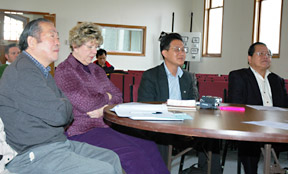Global peace a growing priority for Christian groups
Posted: 1/19/07
Global peace a growing
priority for Christian groups
By Hannah Elliott
Associated Baptist Press
DALLAS (ABP)—Worldwide, about 1.6 million people each year die due directly to violence. Violence is responsible for 14 percent of deaths among males aged 15 to 44 and 7 percent of deaths for females of the same age, the World Health Organi-zation reports. And it’s up to Christians to stop it, several groups working to promote peace around the world insist.
Steve Bostian, U.S. director of Hope Unlimited, said his group’s focus on investing in children in a Christ-centered way separates it from other attempts to eradicate violence among Brazil’s 10 million street children. That investment in individuals rather than broad social change is a model for peace that Bostian—a former American Baptist missionary—hopes to spread.
| See Related Articles: • MAKING PEACE: Creating a congregational culture of peacemaking takes time • Time to call a mediator when focus turns from problems to personalities • Global peace a growing priority for Christian groups • Do conservative evangelicals regret justifying Iraq war? |
Now in its 15th year, Hope Unlimited has provided education, medical attention, housing, counseling and job opportunities for 1,000 children. Located near Sao Paulo, it currently has more than 600 children in three locations.
Only 18 percent of Brazil’s street children are biological orphans, Bostian explained. Most are children who have run away from home to escape violent or neglectful parents. But once the runaways hit the streets, their average lifespan there is less than four years, with most children meeting a violent end. In 2006, the United Nations discovered 16 children are reported murdered every day in Brazil. Many more murders go unreported.
The situation got so bad in the late 1980s and early 1990s that Brazil faced international condemnation after news emerged about death squads killing thousands of “street urchins” pestering local vendors. During those years, Amnesty International listed “street execution” as the third- leading cause of death for Brazilian children.
“The death squad situation was really the impetus for Hope Unlimited,” Bostian said.
The squads consisted of off-duty police officers hired by merchants to get rid of the “nuisance.” Bostian called the underpaid and hardly educated police force “a formula for corruption.” Death squad-type murder still happens in Brazil today, he added.
Short of radical social change, making progress with individual children in Brazil comes down to realizing their worth and potential in Christ—and taking the time to instill that knowledge in themselves, Smith said.
“That’s where the Christian mission comes in,” he said. “It’s really about good, solid biblical parenting. (The children) need discipline. They need instruction.”
Much of Brazil’s violence is exacerbated by the disparity between the rich and the poor. The majority of people there live in abject poverty. And as “haves” and “have-nots” try to coexist in dense urban areas, it becomes a recipe for violence, Bostian said.
According to the World Health Organization, violent death rates vary according to country income levels. Rates of violent death in low- to middle-income countries are more than twice as high as those in high-income countries—32 per 100,000 versus 14 per 100,000, respectively.
That link between violence and poverty is a key component of Rick Warren’s PEACE Plan, a five-point program to eradicate the “giant problems” of poverty, disease, corruption, spiritual emptiness and ignorance that oppress billions of people around the world. The only entity big enough to solve those problems is the church, Warren said.
“The Scripture shows us that Jesus shared the good news, trained leaders, helped the poor, cared for the sick and taught the children,” Warren said. “Our PEACE plan will just do the five things Jesus did while he was here on earth.”
PEACE stands for planting churches, equipping servant leaders, assisting the poor, caring for the sick and educating the next generation. The plan involves a network of small groups that each adopt a village in which to act out the plan. Warren’s ultimate goal for the project is to mobilize 10 million churches, 100 million small groups and 1 billion Christians.
“Why do we do this?” Warren asked. “Why should I care about the sick and the poor and the uneducated and the spiritually empty? Because of what Jesus has done for us. We do it out of gratitude.”
That Christian mandate drives members of the Baptist Peace Fellowship of North America, a Charlotte, N.C., group that provides resources and support to Baptists building “a culture of peace rooted in justice.” Evelyn Hanneman, interim coordinating director of the fellowship, said peace is essential to living the Christian life—including Baptist life—because it’s what Jesus embodied.
“The whole issue of peace is important, given that Jesus is the Prince of Peace,” she said. “Jesus said, ‘Blessed are the peacemakers.’ Peace is what Jesus was about in so many ways.”
Baptist Peace Fellowship emphasizes the concept of shalom as justice. Shalom is a Hebrew word that means inner peace, safety, healing and well-being. Like shalom implies, the simple absence of war doesn’t bring total peace, Hanneman said. Public policy, laws and governments must protect all people so they can live freely in the pursuit of happiness, she said.
“We are very clear that peace is rooted in justice because without justice, you won’t have peace,” she said. “There has to be justice, and that will bring true peace.”
News of religion, faith, missions, Bible study and Christian ministry among Baptist churches, in Texas, the BGCT, the nation and around the world.



